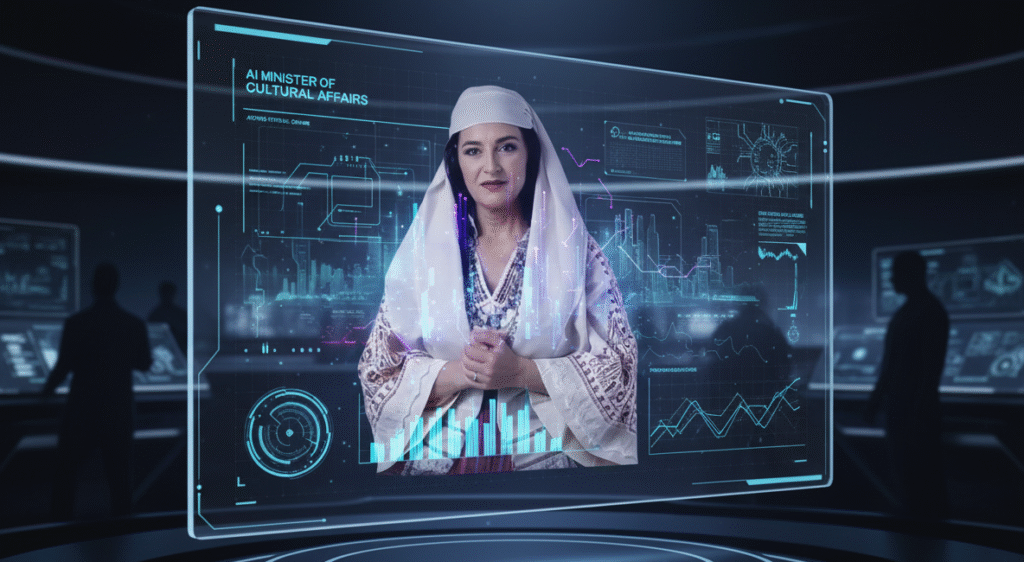Albania has made history. Prime Minister Edi Rama has appointed Diella, an AI-generated virtual assistant, as a cabinet member tasked with overseeing public procurement and eliminating corruption. Named after the Albanian word for “sun”, Diella is the world’s first AI “minister” whose role promises transparency in tendering and public contracts. But while the move is bold, many questions about oversight, legality, and feasibility remain.
What Is Diella and What Does She Do?
Origins & name: Diella was launched in January 2025 on Albania’s e-Albania platform as a virtual assistant. Her avatar appears in traditional Albanian dress and she helps citizens and businesses with state documents via voice commands and electronic stamps.
New mandate: As of September 2025, Diella has been elevated to a ministerial role, virtually created by AI. Her responsibility: managing and awarding all public tenders in which the government contracts private companies, with the declared goal of making tender processes “100% corruption-free.”

Why This Matters: Corruption, Transparency & EU Ambitions
Corruption, favoritism, and misuse of public funds in public procurement have long been the bane of Albania. In May 2025, the current government was re-elected for a fourth consecutive time and is now being pressured domestically and from within European institutions to show some transparency and good governance with respect to rule-of-law matters.
Introducing Diella could mark a turning point—if it works as intended. The AI “minister” model aims not just for symbolic impact but also for concrete change in how tenders are awarded, how funds are allocated, and how citizens perceive fairness.
Key Figures & Platform Reach
According to official sources, Diella has helped issue around 36,600 digital documents and delivered nearly 1,000 services through the e-Albania platform in her virtual assistant capacity.
The digitisation provided by Diella for citizen services reportedly covers up to 95% of public service functions via the state e-platform, through which citizens apply for everything from documentation to service requests.
Challenges & Criticism: Oversight, Accountability, and Risks
While the announcement has generated excitement, the initiative invites several serious questions:
Legality & constitutional status
What legal framework exists for an AI-created minister?
Are Diella’s decisions binding without human oversight? Several experts stress that formalization is needed.
Transparency & manipulation risk
How will the algorithms be audited?
Can Diella be manipulated or become a tool for corruption if not properly secured? Critics worry that lack of detail about oversight could undercut the integrity of the system.
Public trust & perception
Some supporters see powerful promise; others are skeptical. There are social media responses doubting whether “even Diella will be corrupted.”
Operational capacity & technical readiness
Handling every tender requires robust infrastructure, reliable data, secured processes, and skilled technical oversight. Any weaknesses could be exploited.
How Albania’s Move Compares Internationally & Implications
Global first: As far as public reporting shows, Albania is the first country to appoint an AI-generated entity to a ministerial role with real responsibility over public procurement.
The pressure for EU Accession: Transparency in tendering and corruption prevention frameworks are crucial criteria for EU membership. Albania would like to join by 2030; Diella is likely part of that push.
What Success Will Look Like
For Diella’s role to be more than symbolic, the following components must be in place:
Clear legal statutes defining her power, responsibilities and limits.
Transparent audit mechanisms and external oversight.
Secure, tamper-proof systems with checks against bias, data manipulation, or exploitation.
Citizen feedback and appeal processes when tendering/evaluation seems unfair.
Monitoring and reporting results: How many tenders assessed? How much corruption is demonstrably reduced?

Risks of Human Oversight Even With AI Ministers
Even though Diella is an AI-bot, human oversight in her system remains essential—and that’s exactly where corruption risks can still creep in. In the presence of bias, political pressure, or opaque behavior of her own project teams, programming, and auditing, impartial procurement becomes but a hollow promise. Algorithmic biases, black-box decision criteria, deficient audit trails, and missing accountability could render her solutions less than credible. Unless held accountable with proper legal redress and mechanisms of transparency, Diella’s backend human setup runs the risk of reinstating the same favoritism and abuse of public funds she was set up to abolish.
Conclusion
Albania as of now appoints Diella as a virtual minister in its government for overseeing public procurement. This is, in fact, bolder experiment in governance. If it works out, it will probably serve as an example for other countries wishing to make use of AI in public service to improve transparency and accountability. But the promise of a “100% corruption-free” tendering system depends heavily on legal foundations, technical integrity, and credible oversight mechanisms. Diella has generated hype, but the actual litmus test will be her performance, reliability, and the positive impact she has on citizens’ affairs.
Also Read: OpenAI Restructures Research Team Working on ChatGPT Personality
Source: Reuters





















